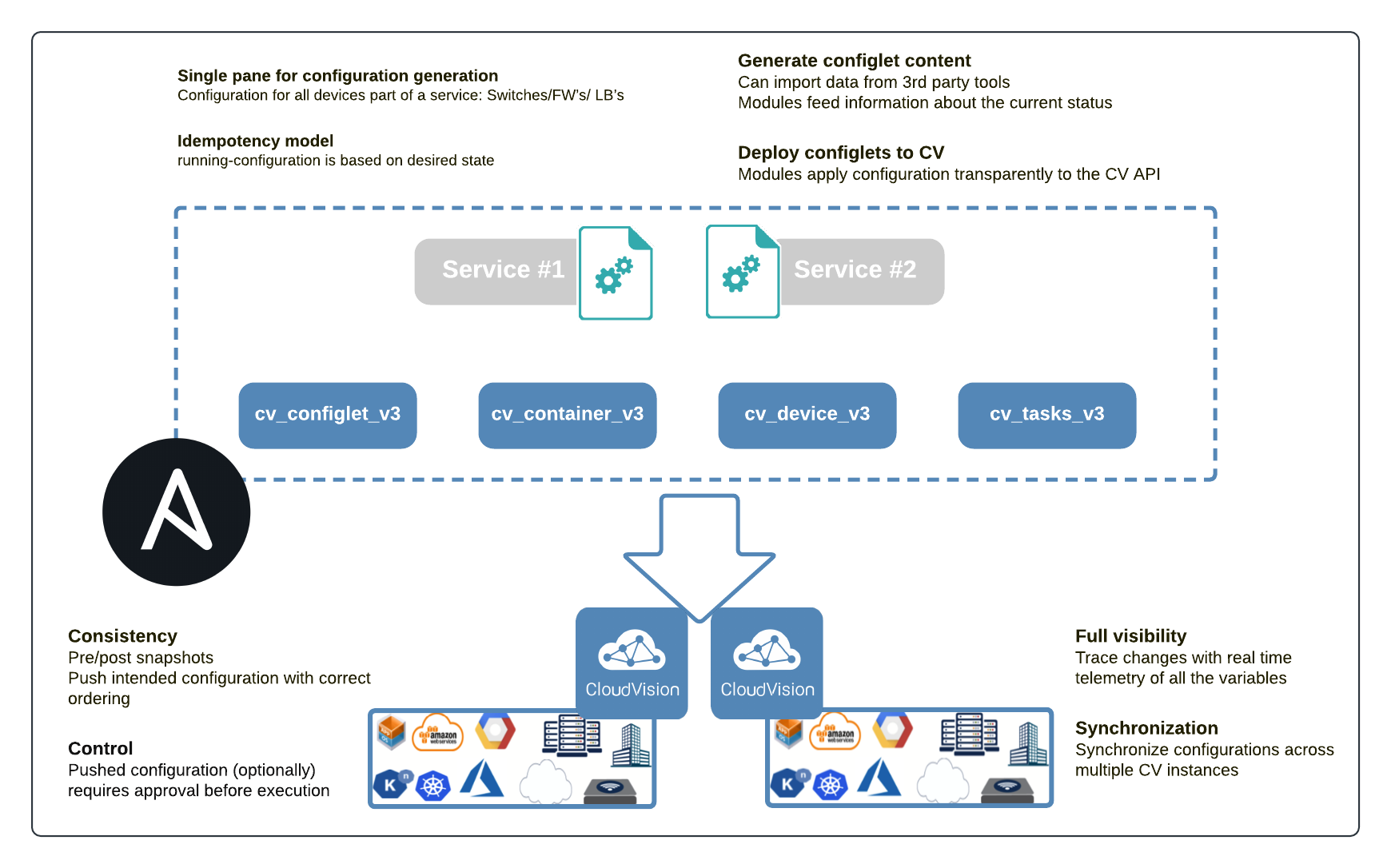Home
Ansible Modules for Arista CloudVision Platform¶
About¶
Arista Networks supports Ansible for managing devices running the EOS operating system through CloudVision platform (CVP). This collection includes a set of Ansible modules that perform specific configuration tasks on a CVP server. These tasks include collecting facts, managing configlets, building topology with containers and devices, and running tasks.

Even if arista.cvp collection is integrated with arista.avd collection to automate configuration deployment, this collection can also be used outside of AVD tasks to populate your CloudVision server with your workflows.
Requirements¶
Arista CloudVision¶
Current active branch:
- CVP 2021.3.x and onward: starting with
ansible-cvp 3.9.0
Info
Starting with version 2.0.0, the collection uses cvprac as the CloudVision connection manager. So support for any new CloudVision server is tied to it’s support in the cvprac Python library.
| ansible-cvp | 1.0.0 | 1.1.0 | >= 2.0.0 | >= 3.9.0 |
|---|---|---|---|---|
| 2018.2 | ✅ | ✅ | ✅ | |
| 2019.x | ✅ | ✅ | ✅ | |
| 2020.1 | ✅ | ✅ | ||
| >= 2020.2 | ✅ | |||
| >= 2021.3 | ✅ |
Python¶
- Python
>=3.9
Please check the minimum version supported by your ansible installation on the ansible website.
Additional Python Libraries required¶
Ansible version:
- ansible-core>=2.14.0,<2.17.0
3rd party Python libraries:
- cvprac
- requests
- jsonschema
- treelib (for modules in version 1)
netaddr>=0.7.19
Jinja2>=2.10.3
paramiko>=2.7.1
requests>=2.22.0
cvprac>=1.3.1
jsonschema>=3.2.0
treelib>=1.5.5
Installation¶
pip install ansible_collections/arista/cvp/requirements.txt
# For modules in version 1
pip install treelib>=1.5.5
Ansible galaxy hosts all stable version of this collection. Installation from ansible-galaxy is the most convenient approach for consuming arista.cvp content
$ ansible-galaxy collection install arista.cvp
Process install dependency map
Starting collection install process
Installing 'arista.cvp:1.1.0' to '~/.ansible/collections/ansible_collections/arista/cvp'
Complete installation process is available on repository website
Collection overview¶
This repository provides content for Ansible’s collection arista.cvp with following content:
List of available modules¶
Version 3:
- arista.cvp.cv_configlet_v3 - Manage configlet configured on CVP.
- arista.cvp.cv_container_v3 - Manage container topology and attach configlet and devices to containers.
- arista.cvp.cv_device_v3 - Manage devices configured on CVP
- arista.cvp.cv_task_v3 - Run tasks created on CVP.
- arista.cvp.cv_facts_v3 - Collect information from CloudVision.
- arista.cvp.cv_image_v3 - Create EOS images and bundles on CloudVision.
- arista.cvp.cv_tag_v3 - Create, delete, assign and unassign tags on CloudVision.
- arista.cvp.cv_validate_v3 - Configlet validation
- arista.cvp.cv_change_control_v3 - Manage change controls on CloudVision.
List of available roles¶
- arista.cvp.dhcp_configuration - Configure DHCPD service on a CloudVision server or any dhcpd service.
- arista.cvp.configlet_sync - Synchronize configlets between multiple CloudVision servers.
Deprecated modules¶
- arista.cvp.cv_facts - Collect CVP facts from server like list of containers, devices, configlet and tasks.
- arista.cvp.cv_configlet - Manage configlet configured on CVP.
- arista.cvp.cv_container - Manage container topology and attach configlet and devices to containers.
- arista.cvp.cv_device - Manage devices configured on CVP
- arista.cvp.cv_task - Run tasks created on CVP.
Example¶
This example outlines how to use arista.cvp to create a container’s topology on Arista CloudVision.
A dedicated repository is available for step-by-step examples on ansible-cvp-toi.
A complete end-to-end demo using Arista Validated Design collection and CloudVision modules is available as an example.
Below is a very basic example of build a container topology on a CloudVision platform, assuming you have three vEOS named veos0{1,3} and a configlet named alias.
---
- name: Playbook to demonstrate cvp modules.
hosts: cv_server
connection: local
gather_facts: no
collections:
- arista.cvp
vars:
# Configlet definition
device_configuration:
mlag-01a-config: "{{lookup('file', './config-router-mlag01a.conf')}}"
mlag-01b-config: "{{lookup('file', './config-router-mlag01b.conf')}}"
# Container definition
containers_provision:
Fabric:
parentContainerName: Tenant
Spines:
parentContainerName: Fabric
Leaves:
parentContainerName: Fabric
configlets:
- alias
MLAG01:
parentContainerName: Leaves
# Device definition
devices_provision:
- fqdn: mlag-01a
parentContainerName: 'MLAG01'
configlets:
- 'mlag-01a-config'
systemMacAddress: '50:8d:00:e3:78:aa'
- fqdn: mlag-01b
parentContainerName: 'MLAG01'
configlets:
- 'mlag-01b-config'
systemMacAddress: '50:8d:00:e3:78:bb'
tasks:
- name: "Build Container topology on {{inventory_hostname}}"
arista.cvp.cv_container_v3:
topology: '{{containers_provision}}'
- name: "Configure devices on {{inventory_hostname}}"
arista.cvp.cv_device_v3:
devices: '{{devices_provision}}'
As modules of this collection are based on HTTPAPI connection plugin, authentication elements shall be declared using this plugin mechanism and are automatically shared with arista.cvp.cv_* modules.
[development]
cv_server ansible_host= 10.90.224.122 ansible_httpapi_host=10.90.224.122
[development:vars]
ansible_connection=httpapi
ansible_httpapi_use_ssl=True
ansible_httpapi_validate_certs=False
ansible_user=cvpadmin
ansible_password=ansible
ansible_network_os=eos
ansible_httpapi_port=443
As modules of this collection are based on HTTPAPI connection plugin, authentication elements shall be declared using this plugin mechanism and are automatically shared with arista.cvp.cv_* modules.
License¶
The project is published under Apache License.
Ask a question¶
To report a bug, discuss or request a specific feature, please open a GitHub issue using the appropriate template.
Contributing¶
Contributing pull requests are gladly welcomed for this repository. If you are planning a significant change, please start a discussion first to ensure we can merge it.
You can also open an issue to report any problem or to submit enhancement.
A more complete guide for contribution is available in the repository